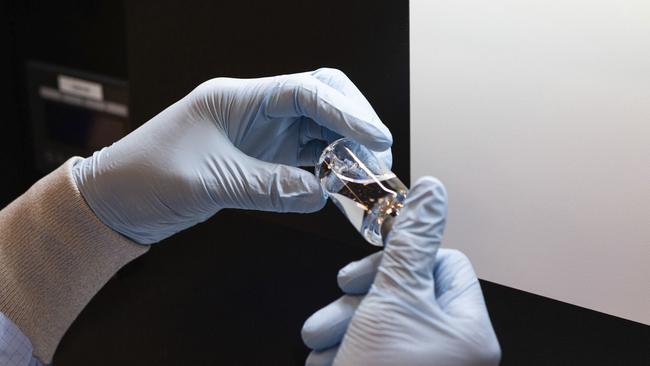COVID-19 treatment Remedsivir is not available for Australian trial
A landmark Australian COVID-19 trial will not get to test the most promising therapy, as it can be revealed there is a worldwide shortage of the experimental treatment.

Coronavirus
Don't miss out on the headlines from Coronavirus. Followed categories will be added to My News.
Exclusive: A landmark Australian COVID-19 trial will not get to test the most promising therapy Remedsivir, as it can be revealed there is a worldwide shortage of the experimental treatment.
Pharmaceutical company Gilead which manufacturers Remedsivir has told News Corp it will not supply any doses of the drug to the ASCOT trial, a major coronavirus treatment trial to be run in 82 hospitals in Australia and New Zealand.
“We are not supplying Remedsivir for the ASCOT trials as these do not form part of the current global clinical trial program.” the company told News Corp.
The pharmaceutical company is supplying the treatment for five other clinical trials, two in China run by Chinese authorities, one in the US study led by the US National Institute of Allergy and Infectious Diseases (NIAID), a European trial sponsored by INSERM in France, and the global Solidarity trial led by the World Health Organisation (WHO).
Doctors at Royal Melbourne Hospital running the ASCOT trial will hold a media conference on Tuesday to explain how the trial will work, a task that is becoming harder as fewer and fewer Australians have the virus.

The World Health Organisation has highlighted Remedsivir as the most promising treatment for COVID-19.
There are currently only 1.5 million doses of the treatment available worldwide and this is enough to treat just 140,000 patients, the company said.
Gilead is ramping up production and hopes to have made enough to treat 1 million people by year’s end.
“We have committed to providing all of our existing Remdesivir supply (at no cost for clinical trials, Clinical Use and Early Access Programs, and following potential future regulatory authorisations globally),” the company said.
Remdesivir works by blocking an enzyme many viruses use to copy themselves, if the virus can’t copy itself it can’t reproduce and survive in the human body.
To date no Australian patient has received the treatment originally developed to treat ebola and only severely ill pregnant women and children will get access to it.
“In Australia we do have access to a small volume of remdesivir under a restricted compassionate use program,” the company said.
“This is reserved for those hospitalised patients with severe complications who are pregnant or under eighteen years of age,” the company told News Corp.
Remedsivir is still an experimental treatment that has not yet been approved for general use by the US Food and Drug Administration or Australia’s Therapeutic Goods Administration so it is difficult for the company to share the recipe with other companies to mass produce it.
It can only be used in a clinical trial setting and the trials are still working out the correct dosage, the most effective formulation and whether it produces side effects.
Already a clinical trial in Chicago has indicated only six days treatment may be needed instead of 10 days, meaning you could treat twice as many people with the supply already available.
The study of 113 people found that all but two COVID-19 patients appeared to respond to the drug and they were discharged from hospital within a week. Two people on the trial died.
“The best news is that most of our patients have already been discharged, which is great. We’ve only had two patients perish,” University of Chicago Hospital’s infectious diseases expert and clinical trial leader Dr Kathleen Mullane said in a video leaked to STAT, a Boston Globe media outlet.
“Most of our patients are severe and most of them are leaving at six days, so that tells us duration of therapy doesn’t have to be 10 days.”
A major weakness of the trial is that it did not compare the efficacy of the treatment against a group of patients who were not given access to the drug.
“Drawing any conclusions at this point is premature and scientifically unsound,” Dr Mullane said.

Australia’s ASCOT trial will test medicines currently used to treat HIV lopinavir/ritonavir or Kaletra and malaria and arthritis treatment hydroxychloroquine to see if it is better to use either drug or a combination of the two.
The trial will involve 2500 patients in over 70 hospitals across the country, in every state and territory, alongside 12 hospitals in New Zealand.
Patients hospitalised with COVID-19 who do not yet require intensive care support will be able to take part in the trial with the aim of preventing them needing a ventilator.
